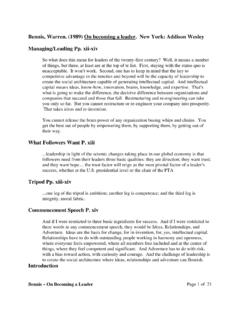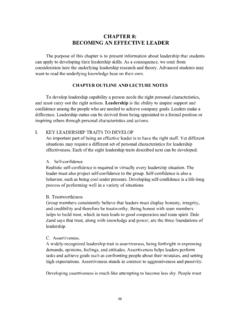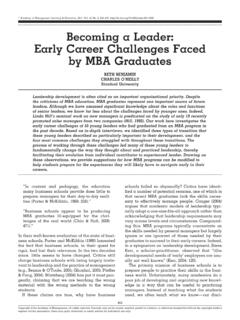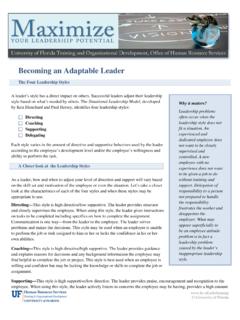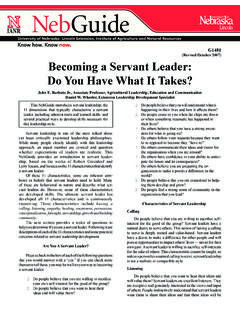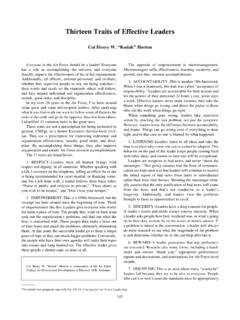Transcription of The Delta Kappa Gamma Bulletin
1 The Delta Kappa Gamma Bulletin International Journal for Professional Educators Spring 2011 Volume 77-3. Models of Leadership 2 The Delta Kappa Gamma Bulletin The Delta Kappa Gamma Bulletin Editorial Board Sigr n Klara Hannesdottir, , 2010-2014. Professor Emerita of Library and Information Studies University of Iceland Reykjav k, Iceland Beverly J. Irby, , 2010-2014. Associate Dean, Graduate Programs College of Education, Sam Houston State University Texas State University System Regents' Professor Huntsville, TX. Janice Novello, , 2008-2012. Doctoral Dissertation Advisor University of Phoenix Phoenix, Arizona Saundra L. Shillingstad, , 2008-2012. Associate Professor University of Nebraska at Omaha Omaha, Nebraska Judith Merz, , Editor Doctoral Advisor, Educational Leadership Nova Southeastern University Ft. Lauderdale, Florida The Bulletin , the official journal of The Delta Kappa Gamma Society International, promotes professional and personal growth of members through publication of their writings.
2 The Bulletin invites materials appropriate to the Society's Purposes: position papers, applied and/or data- based research, and other articles on announced themes or other topics of interest to educators; letters to the edi tor; viewpoints; book reviews; annotated bibliographies; poetry; and graphic arts. Prose manuscripts for the Bulletin , a refereed journal, are reviewed by the Editorial Board and the Soci ety editorial staff. Selection is based on relevance of the topics addressed, accuracy and validity, contribution to the professional literature, originality, quality of writ ing, and adherence to Submission Guidelines (see page 55). Editorial Board members evaluate each submission's focus, organization, development, readability, and acces sibility to the general audience of Bulletin readers. Due to the diversity of the Bulletin audience, material of a reli gious, political, or patriotic nature is not suitable for publi cation.
3 Please send publication materials to or to Bulletin Editorial Staff, The Delta Kappa Gamma Society International, Box 1589, Austin, TX 78767-1589. The Delta Kappa Gamma Bulletin (ISSN 0011-8044; USPS 715-850; IPM 0302295) is published quarterly each year by The Delta Kappa Gamma Society International, 416 West 12th Street, Austin, Texas. Mailing address: Box 1589, Austin, TX 78767-1589. Periodicals Postage paid at Austin, Texas. Subscription, $20 per year; single copies, $5 each. International dues include subscription to The Delta Kappa Gamma Bulletin . Views expressed do not necessarily agree with positions taken by The Delta Kappa Gamma Society International. POSTMASTER: Send address changes to The Delta Kappa Gamma Bulletin Box 1589, Austin, TX 78767-1589. Spring 2011 Models of Leadership 3. The Delta Kappa Gamma Bulletin Spring 2011 Volume 77-3.
4 Published by the Delta Kappa Gamma Society International The Delta Kappa Gamma Society International promotes professional and personal growth of women educators and excellence in education. Call for Submissions.. 4. From the Editor .. 5. On the Theme Licensing Teacher leaders : The Kansas Model By Kathy Martin and Pamela .. 6. School Librarians as Teacher leaders By Audrey P. Church .. 10. Leadership Development for Adolescents: A Case Study By Amie Cox.. 13. Mentoring Female Administrators Toward Leadership Success By Denise P. Dunbar and Ruth T. Kinnersley.. 17. The Effects of Leadership on Innovative Program Implementation By Maria G. Dove and Mary Ellen Freeley .. 25. Facing the Challenge of Change: Steps to becoming an Effective Leader By Margaret A. Trybus.. 33. Balancing Life Roles as a Leader: An Interview with Dr. Melissa Byington Conducted by Saundra Shillingstad.
5 37. Annie Webb Blanton: Poised for Leadership By Joyce G.. 40. H3: The Evidence of Leadership By Constance Hoag and Odelia Schrunk.. 44. Articles In Search of the Zone of Optimum Development for Congenitally Blind Science Learners By Sinikka Smothers.. 47. Changes in Teacher Evaluation: Implications for the Principal's Work By Mary Lynne Derrington.. 51. Submission Guidelines .. 55. Submission Grid .. 56. 4 The Delta Kappa Gamma Bulletin Call for Submissions Members are encouraged to submit manuscripts for consideration by the Bulletin Editorial Board. The Delta Kappa Gamma Bulletin accepts Action Research, Qualitative Research, Quantitative Research, Annotated Bibliographies, Program Descriptions, Position Papers, Book Reviews, Viewpoints, Graphic Arts, Letters to the Editor, and Poetry for print issues (spring, fall) and online issues (summer, winter).
6 Manuscripts should be focused, well organized, effectively developed, concise, and appropriate for Bulletin readers. The style should be direct, clear, read able, and free from gender, political, patriotic, or religious bias. For more detailed information, please refer to the Submission Guidelines on page 55 and the Submission Grid on page 56. Listed below are the suggested themes of upcoming issues. Fall 2011 (78-1) Lifelong Learning (Print). (Postmark deadline is June 1, 2011). Professional Development Elder Hostel Self-directed Learning Leadership . Networking Online Opportunities Returning to School Personal Balance . Brain-based Research Career Changes Alternative Certifications Mentoring . Writing for Publication Conference Attendance International Networking Winter 2012 (78-2) Diverse Learners (Online). (Postmark deadline is September 1, 2011).
7 Immigrant Special Needs Twice-exceptional Children Home Schooling . Differentiated Learners At-risk Disadvantaged Alternative Schools . Guidance and Counseling Media-savvy Youth Readiness and Resilience . Generational Styles (GenX, Millennials, Indigo Children, etc.) . Comparative Educational Practices Around the World Spring 2012 (78-3) Diverse Learners (Print). (Postmark deadline is December 1, 2011). Supporting Early-career Educators Mentoring Support . Second-language Education Ethics Culturally Responsive Teaching Bullying . Multiculturalism Political/Economic/Legal Issues of Education . Assessment The -isms of Education Submit all materials to: Bulletin Editorial Staff Spring 2011 Models of Leadership 5. From the Editor Leadership has been a topic of human discussion for centuries. In the Allegory of the Cave, Plato explored the challenges a leader faces when trying to change an organization a concept that is explored by current authors such as John Kotter, Ken Blanchard, and Michael Fullan.
8 In The Analects, Confucius argued for ethical leadership, a theme found in the modern works of Steven Covey, Robert Greenleaf, and Peter Senge. In The Prince, Machiavelli focused perhaps controversially on the practicalities and strategies of leadership, a topic explored by countless modern business gurus such as Jack Welch or Donald Trump. Leadership theories through the ages have ranged from the Great Man/Woman theory that some are born leaders to behavior theories that argue that leaders can be trained and developed. Transactional theorists have suggested that leadership is accomplished through development of an appropriate system of rewards and punishments for followers, while transformative theorists have argued that leaders must motivate followers through visionary and inspirational methods. In recent years, the theory of emotional intelligence has been woven into leadership discussions, suggesting that self-awareness, empathy, self- confidence, and self-control are critical to a leader's success.
9 These theories have found varied application to all areas of life politics, sports, the military, business and industry, religion, and, of course, education. Clearly, one might argue that educators by their very profession are leaders . The word educate is derived from the Latin educere, meaning to draw out or lead out. Whether one interprets modern education as leading others out of regular thinking or drawing out a person's innate intelligence, educators surely lead in both the practical and theoretical sense planning and implementing lessons and activities that help others learn and contributing to the future by assisting the current generation. Thus, the theme of models of leadership is particularly appropriate for the journal of DKG, an organization of women educators that promotes leadership in so many ways. The articles in this issue explore models of leadership through varied lenses.
10 Learn about a licensing program for teacher leaders , how school librarians can function as teacher leaders , and how educators in one school worked to develop student leaders . Ponder researchers'. findings about the impact of mentoring for female leaders and about the effects of leadership on innovative program implementation. Consider practical advice for leading change or finding balance. In selections focused on DKG leadership, be inspired by founder Annie Webb Blanton's leadership journey and learn about the many leadership resources in H3, the latest volume of DKG history. Finally, enjoy informative, general-interest articles that suggest the challenges of teaching science to blind students (which can inform instruction of all students!) and that detail how principals must change to accommodate new visions of teacher evaluation.
